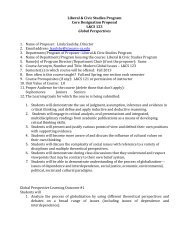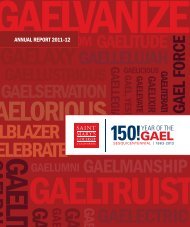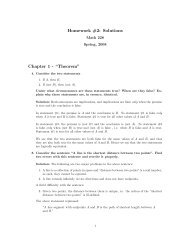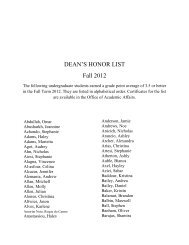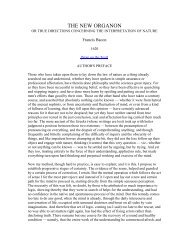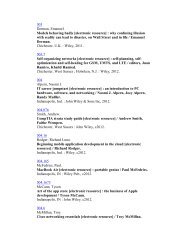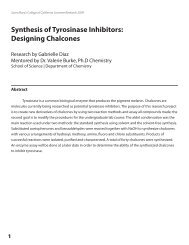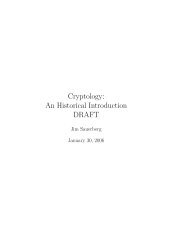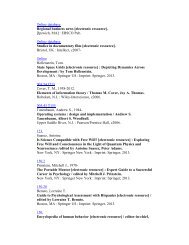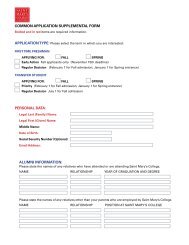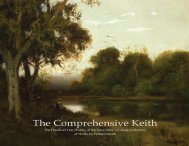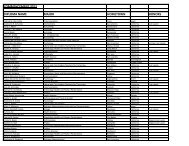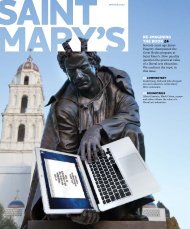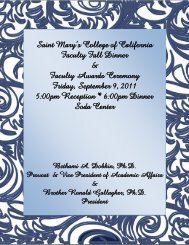School CurriculumTheatre30 Foundations <strong>of</strong> Theatre IA survey <strong>of</strong> major historical developments in theatre, from its ritualorigins to the rise <strong>of</strong> the modern era.33 Acting I: Principles <strong>of</strong> PerformanceAn introduction to the theory, history, and styles <strong>of</strong> realistic actingwith emphasis on personalization, script analysis, and the dynamics <strong>of</strong>performance.36 Theatre Masterpieces: World Dramaor Modern Drama (.5)Discussion and analysis <strong>of</strong> masterworks <strong>of</strong> dramatic literature. A globalperspective showcases playwrights working in diverse styles, eras andtraditions. May be repeated for credit as play selection varies.37 Performance Lab (.5)Introductory hands-on training in specific performance skills: for example,audition techniques, musical theatre, physical comedy, or voice for theactor. May be repeated for credit as topic varies.*Does not satisfy an Area requirement.38 Stagecraft (.5)The fundamentals <strong>of</strong> stagecraft from the first rehearsal to the closing <strong>of</strong>a show, with emphasis on the responsibilities <strong>of</strong> each member <strong>of</strong> theproduction staff. Instruction is given in the use <strong>of</strong> hand tools, power toolsand theatrical equipment, as lab hours are spent building sets and propsfor a mainstage production.*Does not satisfy an Area requirement.130 Foundations <strong>of</strong> Theatre II:Theatre <strong>of</strong> American CulturesAn in-depth study <strong>of</strong> contemporary dramatic literature, focusing primarilyon multicultural elements. Students attend pr<strong>of</strong>essional productions andlearn to utilize current performance theories and practices. Prerequisite:Foundations I [Perfa 30] or consent <strong>of</strong> instructor.136 Theatre: Special StudiesAn intensive study <strong>of</strong> a selected era, genre or movement particularlyrich in theatrical signficance. Analysis, research and concentrated writingpractice are key components <strong>of</strong> the course. Recent topics have includedHistory <strong>of</strong> American Musical Theatre, Contemporary Women Playwrightsand Documentary Theatre; may be repeated as content changes.137 Acting IIIStudents learn advanced performance skills through specially focusedwork such as Shakespearean scene study, comic and dramatic monologues,and the challenges <strong>of</strong> period style. May be repeated for creditas topic varies. Prerequisites: Acting I and II [Perfa 33 and 133] orconsent <strong>of</strong> instructor.138 Stage Lighting Design (.5)A concentrated study <strong>of</strong> lighting for the theatre - from learning thetechnology and providing basic visibility, to understanding how to “paint”with light while enhancing a production’s emotional and artistic impact.Students participate in the semester’s mainstage production and developdesign projects <strong>of</strong> their own. Prerequisite: Stagecraft [Perfa 38]139 Design for the Stage (.5)A concentrated study <strong>of</strong> stage, costume and prop design for the theatre.Students follow the process <strong>of</strong> designing for the mainstage productionwhile working on design projects <strong>of</strong> their own. Special focus is placeddrawing skills, mixing colors and stage terminology.Prerequisite: Stagecraft [Perfa 38]140 Stage Management (.5)A course in the responsibilities and functions <strong>of</strong> a stage manager, fromthe first rehearsal through opening night and beyond. Students developthe skills to run a show in an efficient and positive manner.Prerequisite: Stagecraft [Perfa 38]133 Acting II: Characterization and Scene StudyA continuing exploration <strong>of</strong> the tools and techniques used to bring acharacter to life onstage. Emphasis is given to the development <strong>of</strong> theactor’s instrument - body, voice, emotion and imagination – while partnerand ensemble exercises build toward the performance <strong>of</strong> scriptedscenes. Prerequisite: Acting I [Perfa 33] or consent <strong>of</strong> instructor.135 Theatre in Performance: Bay Area TheatreA critical engagement with current theatre production and practices.Students attend performances throughout the Bay Area, while studyingthe contributions made to each production by the playwright, director,designers and actors. Prerequisite: Perceiving the Performing Arts [Perfa1] or Acting I [Perfa 33] or Foundations I [Perfa 30].143
Curriculum PhilosophyPhilosophyThe Department <strong>of</strong> Philosophy provides an opportunity for every student to continue, in more structured, critical terms,the spontaneous inquiry into basic questions man has raised from the beginning <strong>of</strong> time — questions about himself, aboutGod, about the world in which he lives, and the way in which he ought to live.The word “philosophy” itself, love <strong>of</strong> wisdom, indicates that the search is not concerned with superficial explanations, butprobes beyond appearances for fundamental principles and causes.Hence courses are <strong>of</strong>fered not only to satisfy a major but also to provide an opportunity for students who are interestedin a closer examination <strong>of</strong> one or more areas <strong>of</strong> philosophical inquiry as a worthwhile supplement and broadening factorto their specialized field <strong>of</strong> study.FacultyWayne H. Harter, Ph.D., Associate Pr<strong>of</strong>essor, ChairBrother William Beatie, FSC, Ph.D., Pr<strong>of</strong>essorOwen Carroll, Ph.D., Pr<strong>of</strong>essorSteven Cortright, M.A., Pr<strong>of</strong>essorPatrick Downey, Ph.D., Associate Pr<strong>of</strong>essorJohn A. Dragstedt, Ph.D., Pr<strong>of</strong>essorJoseph Lanigan, Ph.D., Pr<strong>of</strong>essor emeritusLee A. McBride, Purdue University, Irvine Teaching FellowEdward Porcella, Ph.D., Associate Pr<strong>of</strong>essorLearning outcomesThe Philosophy Department seeks to cultivate a unique virtue in its studentsand faculty. This intellectual virtue we have called the Philosophical Habit <strong>of</strong>Mind. It consists, at least, <strong>of</strong> the following abilities:• An ability to situate oneself in the Western philosophical tradition <strong>of</strong>ethical and metaphysical questions and reasoning;• An ability to account to oneself and to others for the bases <strong>of</strong>one’s actions;• An ability to reckon with the consequences <strong>of</strong> one’s own and other’spractical reasoning in various contexts, both personal and political;• An ability to raise metaphysical questions in various concrete, lived,literary, and political contexts;• An ability to distinguish and relate the architectonic questions <strong>of</strong>metaphysics from and to the specialized questions <strong>of</strong> the sciencesand other disciplines;• An ability to discern the interconnection between various modes <strong>of</strong>ethical and political reflection and distinct metaphysical positions;• An ability to pose to oneself the questions raised by the claims <strong>of</strong>the Christian faith on one’s own ethical and metaphysical reasoning;• An ability to read new or contemporary works in the ongoing tradition<strong>of</strong> dialectical philosophy with all these abilities at one’s disposal.John F. Henning InstituteThe Department <strong>of</strong> Philosophy hosts the John F. Henning Institute, acenter for the study <strong>of</strong> Catholic social thought, with special emphasison the question <strong>of</strong> human work and its centrality to the common good.Students are invited to take part in the Institute’s program <strong>of</strong> academicconferences and lectures, publications and seminars.144



